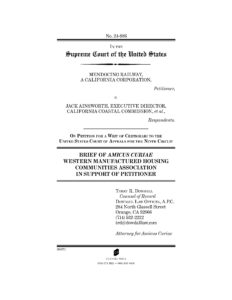The Story Is Finally Told.
By: Terry R. Dowdall
 In the early 1980s, California mobilehome park owners were relentlessly pummeled with partisan efforts (by a dominant majoritarian special interest faction) to pass local rent controls, spurred on by Tom Hayden and Jane Fonda’s example in Santa Monica. Among other demands, they claimed a right to landlord tax savings from Proposition 13.
In the early 1980s, California mobilehome park owners were relentlessly pummeled with partisan efforts (by a dominant majoritarian special interest faction) to pass local rent controls, spurred on by Tom Hayden and Jane Fonda’s example in Santa Monica. Among other demands, they claimed a right to landlord tax savings from Proposition 13.
One city with a notably vitriolic and bitter struggle was the city of Westminster. That ordinance was different though. Complaints emerged from some cities that rent control was too expensive, and punished the city taxpayer–who received no benefits while other homeowners received rent control protection. So the taxpayer was stuck subsidizing a small special interest group of homeowners who contributed no local taxes to the city at all.
Due to ubiquitous litigation against city’s passing local rent control throughout California, efforts were made to appease government with a new cost free system that would cost a city nothing. Various state groups decided to force owners to arbitrate, like it or not. By utilizing arbitration, the dispute over rents would go from city to the private sector, with use of an arbitrator. Utilizing state arbitration laws together with rent regulation criteria would produce tenant-friendly results but without a burden on general revenues.
However, forcing arbitration laws depends on consent. Consent means waiving procedural due process. And absent consent, forcing governmental functions like dispute resolution into private hands is improper. Reviewing rent rate decisions cannot be based on standards for vacating an arbitration award. But much pressure was exerted by large tenant groups and the city relented. The ordinance compelled the Park owners to arbitrate their rent adjustment disputes. Of course, this is unconstitutional.
An example of the story that lead to the downfall of the arbitration ordinance in Westminster is told in an amicus curiae brief for the Western Manufactured Housing Communities Associatrion recently filed in support of the pending Mendocino Railroad case.
Showing that federal courts are a superior form for adjudication of constitutional issues protected by the United States Constitution (especially federal questions), the author explains that it is surmised, in hindsight, that the state Supreme Court, rather than allow an anti-rent control decision to become a binding precedent in California, simply scuttled the decision without licit cause. Officially, without explanation, the court decision striking down the Westminster arbitration law was depublished and thus prevented from becoming a precedent for other parties throughout the state of California. As a consequence, that failure continues to affect local decisions, unconstitutionally requiring arbitration in some remaining municipalities. It is highly doubtful a federal court would have scuttled a unanimous three-judge precedent for an unidentified provincial interest, whatever it may have been.
An interesting side note: there are many property rights victories affecting mobilehome park rent control battles. However, little is known of them because as a rule, government entities (such as counties and municipalities) do not appeal losses of rent control issues in the trial courts: only Parkowners do. Such appeals may not often prevail. As a consequence, published judicial precedents may be very unrepresentative of real life in the Superior Court of the State of California.
In Westminster Mobile Home Park Owners’ Assn. v. City of Westminster (1985) 167 Cal.App.3d 610 (depublished), a group of mobilehome park owners including Los Alisos, a 650+ space park, challenged a novel rent control-arbitration hybrid ordinance in Orange County Superior Court, on state and federal constitutional grounds.
The 1981 Westminster ordinance was a constant source of litigation until 1985, during the halcyon times between birth of the word processor and page limits. So voluminous were the court filings that a court clerk commandeered a wayward grocery basket to manage all the pleadings. The grocery basket went missing, from the courthouse, a week before the preliminary injunction hearing, never found, requiring a re-filing of all the pleadings from all parties.
The ordinance was heavily litigated. It survived “18 tests of constitutionality. …” Los Angeles Times, March 27, 1985, page 62 (“Controls on Rent Hikes Are Ended – Owners of Mobile Homes Loose Fight in Westminster”). The ordinance, fatally, relied for review upon standards to vacate an arbitration award, not substantial evidence review of agency action.
The 4th District Court of Appeal struck down the law. Again, the chief justice depublished the precedent without explanation. This relegated park owners and tenants throughout California to continuing uncertainties.
Eight years later, the arbitration rent control was again nullified in Bayscene Resident Negotiators v. Bayscene Mobilehome Park (1993) 15 Cal.App.4th 119. Still today, some municipalities continue enforcing similar void bars to full appeal rights. Such cities may simply allow proposed rent applications on objection, rather than risk litigation.
In Westminster, unpaid rents kept in tenant-controlled trust accrued to $1.5 million for Los Alisos alone. Los Angeles Times, March 26, 1985, page 59 (“RENT: a Long-Fought Battle Is down to the Wire”). Los Alisos was the largest Westminster park with more than 650 mobilehome sites).
Amicus contends that depublication of the Westminster decision constitutes a miscarriage of justice driven by political factors improperly affecting the outcome. Cudos to the park owners in that City who indefatigibly fought the city and tenants to the successful end of the litigation, including all the battles and skirmishes that took place along the way.

Founding Shareholder

